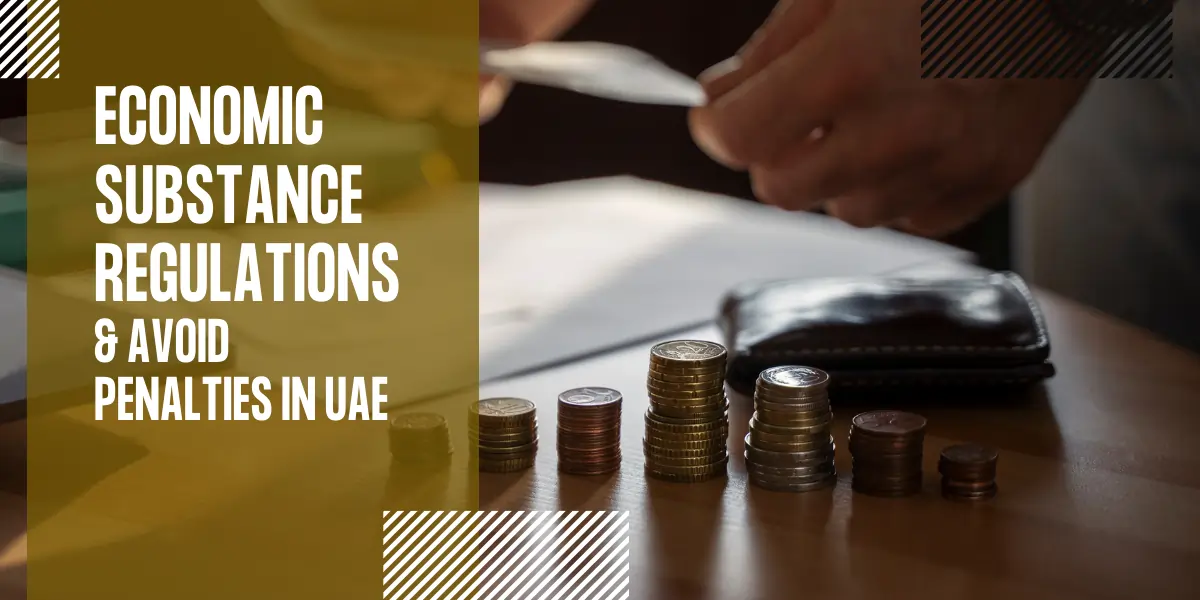
Comply with Economic Substance Regulation & Avoid Penalties in UAE
The Ultimate Guide to Comply with Economic Substance Regulations & Avoid Penalties in Dubai
To stop harmful trade practices, the UAE government implemented the Economic Substance Regulations (ESR). The Dubai Economic Substance Regulations are a collection of guidelines, norms, and specifications that are specific to certain types of enterprises.
What is the primary goal of Dubai’s Economic Substance Regulations? ESR’s main goal is to stimulate the economy by regulating and overseeing the operations of all onshore and free zone legal organizations. The law has also been adopted to make sure that the pertinent organizations follow the appropriate tax laws.
Companies that engage in relevant operations are required by ESR to submit an annual report to the relevant authorities.
Companies that violate the UAE’s Economic Substance Regulations regulation will be subject to heavy fines from the National Assessment Authority. Businesses need to be aware of how the Economic Substance Regulations (ESR) apply in order to stay in compliance and avoid fines. The information that follows will help you understand ESR and how companies may stay out of trouble.
Relevant Activities Your Company Performs
Find out if your business operates in the UAE in a relevant capacity. The Economic Substance Regulations in Dubai apply to nine pertinent activities, and companies that engage in these activities have to comply with the regulations. What kind of business are these? We’ll enumerate them for you.
• The intellectual property industry
• Transportation enterprise
• The corporate headquarters
• The management of investment funds
• The banking industry
• The service center industry
• Conducting business as usual
• Business financing/lease
• The insurance industry
Companies who engage in the activities mentioned above are referred to as licensees, and they are required to comply with all ESR regulations, including filing reports and notices.
Relevant Activities Outside the UAE
The Economic Substance Regulations apply to businesses located in the United Arab Emirates even if they provide services to overseas clientele while conducting relevant activities outside of the nation. Companies in the UAE that sell products or services to customers abroad are in the distribution industry. ESR will so be applicable to them.
If a company sells goods or services to customers in another country but omits to disclose that information in the report, it will be subject to hefty fines. When filing a report to the authorities, license holders who operate an overseas branch—a firm operating under the same name—must include the relevant information.
The previously mentioned rule has only one exception. Economic Substance Regulations are not applicable to a UAE-based company operating abroad that is subject to the tax laws of the host nation in Dubai. ESR regulations will, however, be applicable if the foreign branch is exempt from paying taxes to the government of the foreign nation.
Yearly Assessment
Every year, businesses are required to report their operations to the government. They have to submit reports and notices in order to comply with ESR’s standards. However, it is essential to comprehend the applicability of the Economic Substance Regulations in order to meet these needs and evaluate the pertinent operations of these organizations.
Before the deadline, businesses must send notices and reports to the regulatory bodies. A company is still required to record its operations for that fiscal year even if it goes through liquidation during that time.
Exemption from Economic Substance Regulation UAE
Businesses in the UAE must check if they are exempt from ESR. There’s no need to freak out even if you’re not an expert on Economic Substance Regulations. IBR Group may assist you in solving the puzzle and making sure that compliance is correct.
The responsibilities of ESR do not completely release exempt licensees. Like non-exempt entities, these exempted licensees are required to notify the regulatory bodies. License holders are required to indicate in their notification whether they are exempt and to substantiate their claims with supporting documentation.
Businesses won’t be considered exempt without proof, and they will be penalized by the government. Businesses also need to be aware of the exemption period. What prerequisites must a corporate organization meet in order to be eligible for exemption? Let’s analyze.
• There is no exemption available for any relevant revenue from the relevant activity.
• Assume a citizen of the United Arab Emirates engages in business within the country and avoids collaborating with foreign companies. Then, it can be eligible for an exemption.
• An investment fund is also eligible for exemption if it does not generate relevant revenue within the designated reporting period.
• A holding company business’s investment or purpose vehicle that generated no revenue during the reporting period is also exempt.
Deadlines for Economic Substance Regulations in Dubai, UAE
Businesses in the United Arab Emirates may have a separate the financial year. Businesses who generate revenue from relevant activities and aren’t exempt from the Economic Substance Regulations in the United Arab Emirates are required to submit an ESR report.
Notifications of the Economic Substance Regulations in the United Arab Emirates and ESR notifications are two different forms that must be submitted by companies that fall within ESR’s jurisdiction. These companies are required to notify the authorities of all the pertinent actions they have carried out and the money they have made from them.
In addition, they must turn in an ESR report within a year of the fiscal year’s conclusion. Assume that a business satisfies the exemption requirements or that it did not generate any revenue from the relevant activities throughout the fiscal year. Nonetheless, if the company engages in the pertinent actions, it has to file a notification.
Businesses will be subject to severe penalties if they neglect to submit a report or notification on time. To learn more about penalties, move on to the next section.
Applicable Penalties
• If the licensee does not submit the Economic Substance Regulations in UAE notification by the deadline, the authorities will fine it AED 20,000.
• Licensees who neglect to turn in the ESR report by the deadline will be fined AED 50,000.
• Licensees who file the ESR report but neglect to include the necessary records or reports risk an AED 50,000 fine.
• If license holders fail the ESR exam for a specific cause, they will be subject to a penalty of AED 50,000.
• License holders who fail the ESR test a second time in a row will be fined AED 400,000 by the authorities.
We’ll talk about the non-monetary punishments now. These non-monetary sanctions include sharing information with foreign authorities and suspending, revoking, or failing to renew the licensee’s trading license. Entities who believe they have been unfairly fined must comprehend the reasoning behind the initial imposition of these fines and file a suitable appeal.
Penalties can be imposed for even a single mistake, and repeated infractions will result in more severe punishments. Appeals may provide licensees with a great chance to clarify any unclear areas, depending on how one interprets the Economic Substance Regulations in the United Arab Emirates.
Businesses who violate the ESR are required to take proactive measures to assure compliance and stop future violations.
The following aspects of the Economic Substance Regulation UAE can be assisted by IBR Group
• Crafting expert answers to questions from the appropriate UAE authorities.
• Support in comprehending the appeals procedure.
• Offer guidance on non-compliance and the actions required to guarantee compliance while averting additional problems.
We have over 10 years of experience in the accounting and finance industries, offering a comprehensive range of financial services, including legal compliance advice. Our experience leads us to believe that the majority of non-compliance concerns result from entities’ ignorance of the ESR law’s requirements and the lack of monitoring or supervisory measures to assure compliance.
